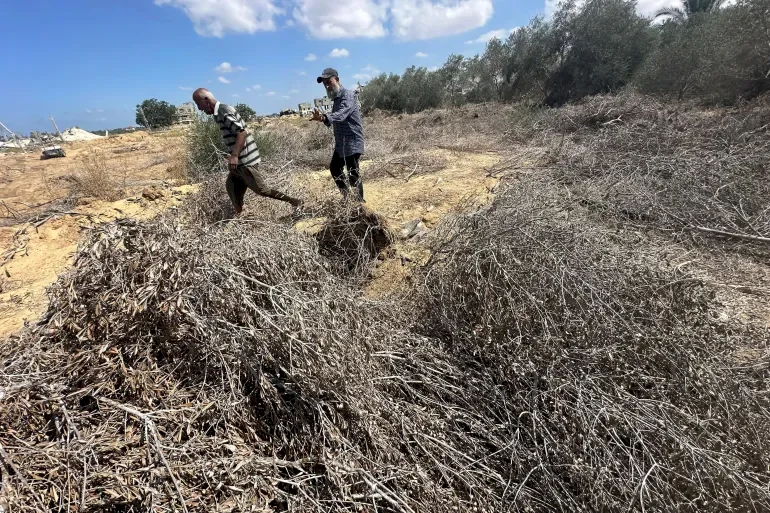
The International Olive Council Demands Accountability from Israel for Its Attacks on Olive Trees and Compensation for Palestinian Farmers for Their Losses
SadaNews - The advisory body of the International Olive Council has called on the international community to intervene to hold "Israel" accountable for the crimes it commits against olive trees in Palestine, emphasizing the necessity of compensating Palestinian farmers for their losses due to these ongoing attacks.
This came during the recent 65th meeting of the advisory body of the International Olive Council held in the Spanish capital Madrid, with the participation of (18) attending countries, both producing and consuming olive oil from different continents, including Palestine represented via video conference by Fayyad Fayyad, the Director General of the Palestinian Olive Oil Council.
The meeting upheld one of the most important principles on which the council is based, which is the defense of the olive tree and ensuring its protection. The attendees stressed the necessity of committing to the defense of olives and olive oil produced in various countries worldwide, without discrimination in source or origin, asserting that the only acceptable difference is the quality standard, and that spreading misconceptions that may provoke discrimination or doubt harms the unity of this global sector united by one noble product, regardless of the differences in soil and climate.
The meeting was chaired by Abdel Salam Al-Wad, the head of the advisory body of the International Olive Council, who addressed the tragic situation of the olive tree in the Palestinian territories, where this blessed tree is subjected daily to systematic uprooting by the Israeli occupation, and farmers are prevented from accessing their farms to harvest olives, expressing the advisory body’s support for Palestinian farmers and calling on the international community to shoulder its responsibilities regarding these violations.
Al-Wad emphasized the necessity of developing a new vision for cooperation among players in the olive oil sector, based on principles of transparency, sustainability, and justice, to ensure a fair distribution of the revenues of this natural wealth among all players.
For his part, Fayyad Fayyad, in his speech, reviewed the reality of the olive sector in Palestine, indicating that the occupation authorities are operating under a systematic plan to destroy the olive tree in Palestine, noting that the occupation has uprooted nearly one million olive trees since its occupation of the West Bank in 1967.
Fayyad pointed out that from 2010 until last September, the occupation uprooted (250,274) olive trees, and since October 2023 until today, it has uprooted (56,077) trees.
Fayyad noted that in the town of Al-Mghayir in the Ramallah and Al-Bireh Governorate, the occupation uprooted (10) thousand olive trees in one day last August, and worked to reduce the area of the town from about (25) thousand dunams, most of which were planted with olives, to less than a thousand dunams after confiscating most of the town's land.
As for the Gaza Strip, Fayyad confirmed that the occupation committed a major crime during the genocide war that lasted nearly two years, as only (100) thousand trees remain in the strip from the original one million trees that existed before the war, in addition to the destruction of (35) olive oil presses out of (40) olive oil presses.
The session was attended by (Jaim Lilo), the Executive Director of the International Olive Council, and Abdel Raouuf Al-Ajimi, the Deputy Director.
At the end of the meeting, the advisory body issued a plea to the U.S. administration to remove the tariffs imposed on olive oil imports from various countries, due to its nutritional and health benefits confirmed by global scientific research.
It is noteworthy that the International Olive Council was the first official organization to recognize Palestine after it was recognized as a non-member state in the United Nations in 2011. However, this recognition did not grant Palestine full membership in the council as it requires the approval of all council members, which was not available at the time due to Israeli opposition.
In 2016, after years of unsuccessful attempts, the Tunisian Abdel Latif Ghdeira took office as the Executive Director of the International Olive Council, which constituted a window of hope, seizing the opportunity in March 2017 to hold a meeting of the Board of Directors of the International Olive Council, where the countries rotating in the presidency were Arab and friendly nations, and Palestine's acceptance into the council as a member was passed on March 16, 2017, taking advantage of the absence of the "Israeli" representative from the meeting.

Al-Natsheh: The Eighth General Conference of 'Fatah' Must Be a Step Forward Towards Revivi...

Occupation Forces a Jerusalemite to Demolish His Home in Silwan

More than 24,000 travelers passed through the Karama crossing last week

Police in Ramallah Arrest Suspect for Committing 50 Thefts

Weather Conditions: Rise in Temperatures

70,000 Perform Friday Prayer at Al-Aqsa Mosque

Weather Conditions: Dusty and Partly Cloudy with Rising Temperatures

